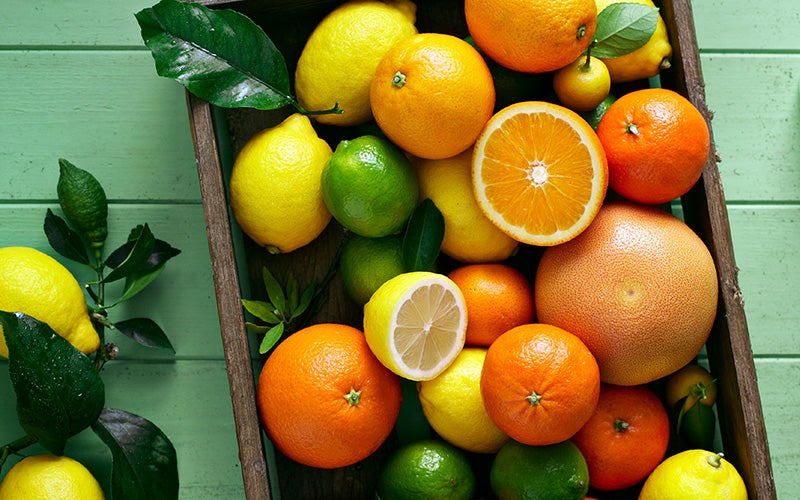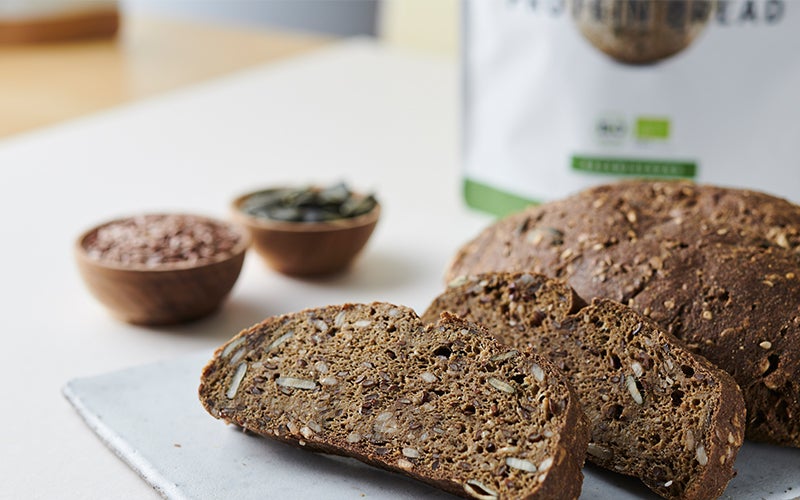Citrus Fruits: What’s behind these Vitamin C powerhouses?
 ©Martin Poole
©Martin Poole
They’re not only juicy treats – citrus fruits have a lot to offer in terms of both nutrients and taste. Here we’ll explain the qualities that make these classic fruits so special.
What are citrus fruits?
Citrus makes us happy all year round. In summer, they are the perfect healthy refreshment and in winter they serve as heavy-duty immune boosters. So long, endless cold season!
But before we go into more detail, let’s take a little excursion into botany. In fact, botanically speaking, citrus fruits are among the berries, or to be more precise, the endocarp berries. Who would have thought! They are characterized by their juicy flesh and firm skin, called the endocarp.
Whether orange, green or yellow – citrus fruits are definitely a colorful affair. Although they belong to the same plant family, their appearance varies greatly in terms of color, shape, and size. But oranges, grapefruits, lemons and the like all have one very special thing in common: citrus fruits are generally considered to be healthy. We’ll discover how so in the next section.
A salad always does the trick. That’s why we have a recipe for you here. Let’s say this much: this healthy dish is the perfect mixture of spicy, fruity and crunchy. You don’t want to miss out on an explosion of flavor.

The nutrients found in citrus fruits
Of course, each type of citrus fruit has its own set of nutrients. Overall, however, they all score points here. Mandarin oranges, limes, and their relatives contain health-promoting, nutritional compounds. These include, for example, antioxidants that protect cells from free radicals, slow down the aging process, and reduce the risk of cancer. The white pulp of clementines or oranges can be eaten, by the way – that’s precisely where these anti-inflammatory and antioxidant flavonoids are found.
Citrus fruits are quite low in calories and fat; it’s carbohydrates such as fructose and dextrose that provide that energetic boost.
Also interesting: the aromas and fruit acids contained in citrus, together with their natural sugar content, are responsible for their taste. Even though this varies from species to species, all citrus fruits have their own distinct flavors.
Oranges, grapefruits, etc. also contain minerals such as calcium, potassium, and fiber. Although the fiber content is rather low compared to other fruits, your digestive system will thank you.
As we all know, citrus fruits are best known for a very specific nutrient: Vitamin C. They’re actually considered to be absolute vitamin C bombs. The German Society for Nutrition recommends that adults consume a daily dose of between 95 and 100 milligrams – two oranges alone nearly cover that.
Vitamin C in citrus fruits: How the nutrient works
As is well known, winter is cold and flu season. But it doesn’t need to be that way. A natural superhero could save you from sneezing, sniffling, and coughing. We’ re talking about vitamin C, of course, which is essential for a functioning immune system.
In order to lower the risk of getting sick, you should always have plenty of it in your body, especially during the cold season. One major source is obvious: citrus fruits.
And while it may shorten the course of a cold, it’s more effective as a preventative measure. That’s why it’s best not to only treat yourself to a hot lemon water when you’re already under the weather, but, for the popular household remedy, just adding some lemon juice and a little honey to hot water.

By the way, vitamin C is not only important for our immune system, but is also involved in various metabolic processes. In fact, it’s important when it comes to building up connective tissue, teeth, and bones. It also prevents dangerous toxins from damaging cells and molecules in the body.
Citrus fruits: List of our favorites
The list of species belonging to the citrus family is long – so long that it would probably go beyond the scope of this article to just name them all. So let’s focus on our favorites:
Orange
The orange is the classic citrus, which withstands the test of time and trends. This is probably due to its unique taste, valuable nutrients, and versatility. Whether on its own as juice or as an ingredient for sweet or savory dishes – the orange is an all around winner.
Lemon
The lemon may not be the ideal fruit to enjoy by itself, but it’s still one of our absolute favorites because of its ability to add a very special and sour note to various dishes and drinks. Its aromatic peel is also a popular garnish and an indispensable part of international cuisine.
Tangerine
There’s probably not a winter in which tangerines are not on the menu. The citrus fruit, which has been around for more than 3000 years, is simply part of the colder season. By the way, they’re also often confused with the clementine, but clementines are actually a cross between tangerines and bitter oranges.
Grapefruit
The grapefruit has traveled a long way from its origins on the island of Barbados. In recent years, the citrus fruit with its bitter aftertaste has become particularly popular in fitness cuisine, as its active ingredients are said to stimulate digestion and prolong the feeling of fullness.
Pomelo
The pomelo is often confused with the grapefruit, but there are some differences. The former has a different shape, is much heavier and larger – it’s actually the largest citrus fruit – but also has a sweet-sour and bitter taste.
Note: The bitter substances contained in both grapefruit and pomelos can potentially interact with certain medications. Be sure to consult with a physician or expert if you are taking any medications.
Kumquat
Did you know that the kumquat is the smallest known citrus fruit? Despite its smaller size, it is an absolute powerhouse – and one of the few citrus fruits you can consume whole with its seeds and peel. It should, however, be washed thoroughly before consumption.
Delicious recipes with citrus fruits
A warm soup is a must in winter. And citrus fruits can play a crucial role in creating a delicious one. Here’s the recipe:
Sweet potato soup with grapefruit
(Serves 2)
Ingredients: 1 grapefruit, 250g sweet potatoes, ½ onion, ½ garlic clove, ¼ pepper, 1 tbsp coconut oil, 300g vegetable stock, 1 tsp goji berries, salt, pepper, fresh coriander
- Start by dicing the onion and finely chopping the garlic
- Next, peel the sweet potato, then cut it into small cubes
- Now heat the coconut oil in a pot and fry the onion
- Add both garlic and sweet potato to the pot
- Finely chop the pepper, and also add to the pot
- Now add the vegetable stock
- Squeeze the grapefruit and add the juice
- Season with a little salt and pepper and let it simmer for about 20 minutes
- Now puree the soup, and garnish it with goji berries and some coriander
When it is cold and uncomfortable outside, staying at home is the best place to be. Why not pass some time in the kitchen? For example, by preparing a delicious low-carb spread that is perfect for your homemade protein bread.

Try our delicious Protein bread
Sugar-free kumquat marmalade
Ingredients: 200g kumquat, 50ml freshly squeezed orange juice, 80g gelatin xylitol (3:1), 1 pinch of vanilla, rum extract.
- Cut kumquats into large pieces and remove seeds
- Mix the fruit pieces with the gelatin xylitol and leave in the refrigerator overnight
- The next day, add fresh orange juice, vanilla, and 3 drops of rum extract to the kumquat-xylitol mix. Depending on your mood, you can also add your favorite spices like rosemary or cardamom.
- Add everything into a small pot and boil for 5 minutes, stirring frequently.
- Fill a clean jar with the jam and seal it with a lid. Then let it cool down and enjoy within one week after opening!
Citrus fruits: Summary
- Botanically speaking, citrus fruits are a kind of berry.
- Be it oranges, lemons, grapefruits, or kumquats – they all contain a number of health-promoting nutrients and a lot of vitamin C.
- The vitamin C found in citrus fruits is important for a properly functioning immune system and can help prevent colds.
- The different types of citrus fruits have different flavors and can thus give different dishes and drinks a special touch.
Sources for this article
We at foodspring use only high-quality sources, including peer-reviewed studies, to support the facts within our articles. Read our editorial policy to learn more about how we fact-check and keep our content accurate, reliable, and trustworthy.
- Bundeszentrum für Ernährung (2018): Zitrusfrüchte – Die Besonderen unter den Beeren https://www.bzfe.de/inhalt/zitrusfruechte-die-besonderen-unter-den-beeren-31760.html
- Bundeszentrum für Ernährung (2020): Zitrusfrüchte: Gesund essen http://www.bzfe.de/inhalt/zitrusfruechte-gesund-essen-28226.html
- DGE (2015): Hilft Vitamin C gegen Erkältungen? https://www.dge.de/presse/pm/hilft-vitamin-c-gegen-erkaeltungen/
- Bundeszentrum für Ernährung (2018): Die Kumquat https://www.bzfe.de/inhalt/die-kumquat-31790.html
- Bundeszentrum für Ernährung (2016): Von Mandarinen, Clementinen und Satsumas https://www.bzfe.de/inhalt/von-mandarinen-clementinen-und-satsumas-28979.html
- Bundeszentrum für Ernährung (2017): Grapefruit und Pampelmuse https://www.bzfe.de/inhalt/grapefruit-und-pampelmuse-29742.html
































